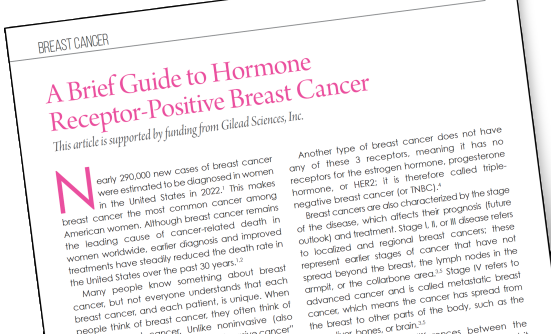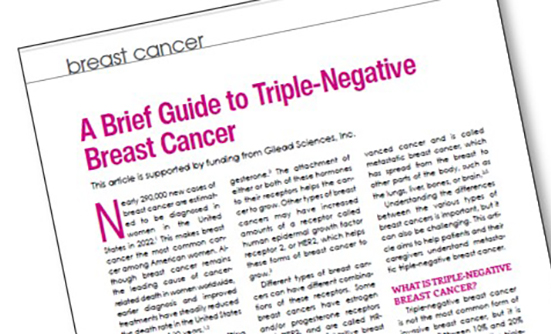
Everyone has BRCA1 and BRCA2 genes. BRCA genes assist in the normal growth of cells in the breasts, ovaries, and other organs. In the 1990s, researchers discovered that genetic mutations in BRCA1 and BRCA2 genes increase the risk of developing specific types of cancer. Although this is an important discovery, it is also important to recognize that not everyone with a BRCA gene mutation is destined to develop cancer.
Most people who develop breast cancer have no family history of the disease and no BRCA gene mutation. However, if you do have a family history of breast cancer, ovarian cancer, or both, a BRCA mutation could have played a role. This means it is important to know your cancer family pedigree.
Genetic Testing
Women who inherit a mutation in either the BRCA1 or BRCA2 gene have a higher than average lifetime risk of developing breast cancer and/or ovarian cancer when compared with the general population. If you have received a breast cancer diagnosis, your doctor will consider several factors to determine if genetic testing is a good option for you. If you fit into one of the following categories, you will likely be referred for genetic testing:
- You are younger than 50 years
- You have a first-degree relative (mother, sister, daughter, father, brother) who has had breast, ovarian, pancreatic, melanoma, or prostate cancers (in particular men in your family diagnosed with prostate cancer before age 60 years)
- You were diagnosed with a triple-negative breast cancer, meaning the breast cancer does not have estrogen receptors (ERs), progesterone receptors (PRs), or human epidermal growth factor receptor 2 (HER2)
- You have been diagnosed with metastatic breast cancer.
Genetic Counseling
If your doctor orders genetic testing, it is important to also receive genetic counseling before the test is completed. Genetic counseling will help you to understand the implications of the test and prepare you for the possibility of a mutation. For example, if you have a BRCA gene mutation, your doctor may recommend more extensive surgery to reduce your risk of local recurrence. There will be implications for your family, as they may have the inherited mutation as well. (Fifty percent of biological offspring will inherit the gene from their parent. Also, 50% of siblings will carry the gene mutation.) Genetic counseling can help you to prepare for these conversations.
How Does a BRCA Gene Mutation Impact Surgical Options?
If you have a BRCA gene mutation, you have an increased risk of developing breast cancer again. It could recur in the same breast as the initial tumor (known as a local recurrence), or it could recur as a new cancer in the other breast (known as a new primary cancer in the opposite or ipsilateral breast). For this reason, a breast surgical oncologist will likely recommend bilateral mastectomies (removal of both breasts) with some form of reconstruction, if desired. This is true even if the tumor is small and could otherwise be removed by lumpectomy. Skin-sparing, nipple-sparing, and areola-sparing surgery may still be an option for you if the tumor is far enough from these structures.
Ovarian Cancer
It is not unusual for a woman with a BRCA gene mutation to also have a higher risk of developing ovarian cancer. Ovarian cancer is more difficult to diagnose early. Women with a BRCA gene mutation will sometimes have an annual blood test for a specific ovarian tumor marker (called CA125) and/or an annual transvaginal ultrasound as screening methods for ovarian cancer.
If you do not plan to become pregnant in the future, then serious consideration should be given to having your fallopian tubes and ovaries removed to reduce your risk for ovarian cancer. Note the inclusion of fallopian tubes, because ovarian cancers usually start in the fallopian tubes and grow into the ovaries.
Any feelings of bloating, weight loss (without trying to), or bowel irregularities should be brought to your oncologist’s attention, and a pelvic exam should be performed.
BRCA in Triple-Negative Breast Cancer
It is fairly common that a person with a BRCA gene mutation also has a triple-negative breast cancer, meaning the tumor is ER negative, PR negative, and HER2 negative. This limits the options for overall systemic treatment. Drugs that target HER2 are not an option, nor is hormone therapy, because the tumor does not have receptors for the estrogen and progesterone hormones. As a result, chemotherapy is commonly given. There is a wide range of different regimens that your medical oncologist will discuss with you. There are also newer drug categories being researched in clinical trials that may be an option for you as well.
Knowledge Is Power
Learning that you have a BRCA gene mutation is certainly hard to hear after everything you have already been through. But I would like to offer this encouragement—knowledge is power. If you or someone in your family has a BRCA gene mutation, you can use this knowledge to make proactive decisions about your own healthcare. If you have a BRCA1 gene mutation, you should strongly consider sharing this information with your family because they are at a high risk for getting breast and/or ovarian cancer. And anyone with a BRCA2 gene mutation has an increased risk of developing cancers, including breast, ovarian, pancreatic, melanoma, and prostate cancer. Also realize that men can carry either of these gene mutations. If a man carries a BRCA1 gene mutation, his personal risk of getting breast cancer is relatively low. However, he will pass this gene on to 50% of his offspring, and if they are girls, their risk can go up as high as 60% to 80% for getting breast cancer and 40% for getting ovarian cancer.
So by taking these practical steps and getting tested, if advised to, you come away empowered with new knowledge. With this knowledge, you will receive more frequent screenings to detect a cancer as early as possible. With this knowledge, you can opt for surgery to prevent cancer from developing. With this knowledge, you can help family members to understand their risks.

Case Study: Lifting the Taboo of the “C-Word”
I recall a 38-year-old woman diagnosed with breast cancer. Although she had 4 older sisters and a mother, she always came to her appointments alone. She shared with me that she had not told anyone in her family. Cancer—the “C-word”—was not something their family could discuss comfortably. She felt as if it was taboo to even mention it. I encouraged her to put the fear aside and talk to her family. She refused. I explained that this is important information for her sisters and mom because it means they need closer screening. Still, the answer was no. Further, she declined genetic testing despite her young age.
Two years after she completed treatment, she decided to tell her family. While she was preparing a meal alongside her sisters in her mother’s kitchen, she finally shared the news of her diagnosis.
She called me the following day to tell me about this experience and the shocking admissions she received from her sisters and her mother. Every single woman in that kitchen—her 4 sisters and her mother—one by one admitted that they too had been diagnosed with breast cancer and also chose not to tell anyone.
The family came in for genetic testing, and all tested positive for a BRCA gene mutation. Several opted for prophylactic mastectomies along with salpingo-oophorectomies (removal of the fallopian tubes and ovaries). They collectively spoke to the congregation at their church to tell their story and urge women to get annual mammograms once they turn 40 and to share medical information within their family. Removing the taboo and openly discussing cancer risk is very important for the health and well-being of the entire family.













